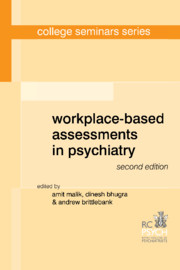Book contents
- Frontmatter
- Contents
- List of tables, boxes and figures
- List of contributors
- Preface
- 1 Introduction: changes in training
- 2 Workplace-based assessment methods: literature overview
- 3 Case-based discussion
- 4 The mini-Assessed Clinical Encounter (mini-ACE)
- 5 The Assessment of Clinical Expertise (ACE)
- 6 Multi-source feedback
- 7 Direct Observation of Non-Clinical Skills: a new tool to assess higher psychiatric trainees
- 8 Workplace-based assessments in psychotherapy
- 9 Educational supervisor's report
- 10 Portfolios
- 11 Annual Review of Competence Progression (ARCP)
- 12 Examinations in the era of competency training
- 13 Piloting workplace-based assessments in psychiatry
- 14 Developing and delivering an online assessment system: Assessments Online
- 15 A trainee perspective of workplace-based assessments
- 16 Conclusions
- Appendix 1 Assessment forms
- Appendix 2 Guide for ARCP panels in core psychiatry training
- Appendix 3 The MRCPsych examination
- Index
13 - Piloting workplace-based assessments in psychiatry
Published online by Cambridge University Press: 01 January 2018
- Frontmatter
- Contents
- List of tables, boxes and figures
- List of contributors
- Preface
- 1 Introduction: changes in training
- 2 Workplace-based assessment methods: literature overview
- 3 Case-based discussion
- 4 The mini-Assessed Clinical Encounter (mini-ACE)
- 5 The Assessment of Clinical Expertise (ACE)
- 6 Multi-source feedback
- 7 Direct Observation of Non-Clinical Skills: a new tool to assess higher psychiatric trainees
- 8 Workplace-based assessments in psychotherapy
- 9 Educational supervisor's report
- 10 Portfolios
- 11 Annual Review of Competence Progression (ARCP)
- 12 Examinations in the era of competency training
- 13 Piloting workplace-based assessments in psychiatry
- 14 Developing and delivering an online assessment system: Assessments Online
- 15 A trainee perspective of workplace-based assessments
- 16 Conclusions
- Appendix 1 Assessment forms
- Appendix 2 Guide for ARCP panels in core psychiatry training
- Appendix 3 The MRCPsych examination
- Index
Summary
There are two main reasons for piloting the use of workplace-based assessment (WPBA) tools in psychiatry. The first relates to meeting the requirements of the competent authority for the regulation of postgraduate medical training (at the time, the Postgraduate Medical Education and Training Board (PMETB), since April 2010, the Postgraduate Board of the General Medical Council), and the second relates to winning the confidence of other stakeholders in the assessment process, particularly that of psychiatric trainers and trainees.
In 2004, PMETB (Southgate & Grant, 2004) stipulated nine principles that assessment systems in postgraduate medical education should meet to gain the necessary approval from the Board. In 2008, the Board rewrote the ‘principles’ as ‘standards’ and merged the standards for assessments with those for curricula to produce 17 combined standards; they were then updated by the General Medical Council (GMC) in 2010 (GMC, 2010). Box 13.1 shows the standards that apply to assessment systems.
In view of the high validity of WPBAs, the PMETB has recommended that this form of assessment be included as part of ‘an overarching assessment strategy’ (PMETB, 2005). The introduction of new assessment systems, including WPBAs will inevitably necessitate the development of new instruments and the adaptation of established tools to new situations. One of the requirements within PMETB's Standard 8 was that methods of assessment, including WPBAs, be chosen for use on the basis of validity, reliability, feasibility, cost-effectiveness, opportunities for feedback and impact on learning.
The second purpose of piloting the new methods of assessment is to win the confidence of the main end-users of the assessment system: psychiatric trainers and trainees. The evidence from studies that have examined how innovations come to spread in human systems indicates that change does not follow apparently logical paths of dissemination and implementation, but rather the social networks, relationships and informal opportunities for information sharing of the actors within the system are vital components of the change process (Dopson et al, 2002).
- Type
- Chapter
- Information
- Workplace-Based Assessments in Psychiatry , pp. 142 - 153Publisher: Royal College of PsychiatristsPrint publication year: 2011

